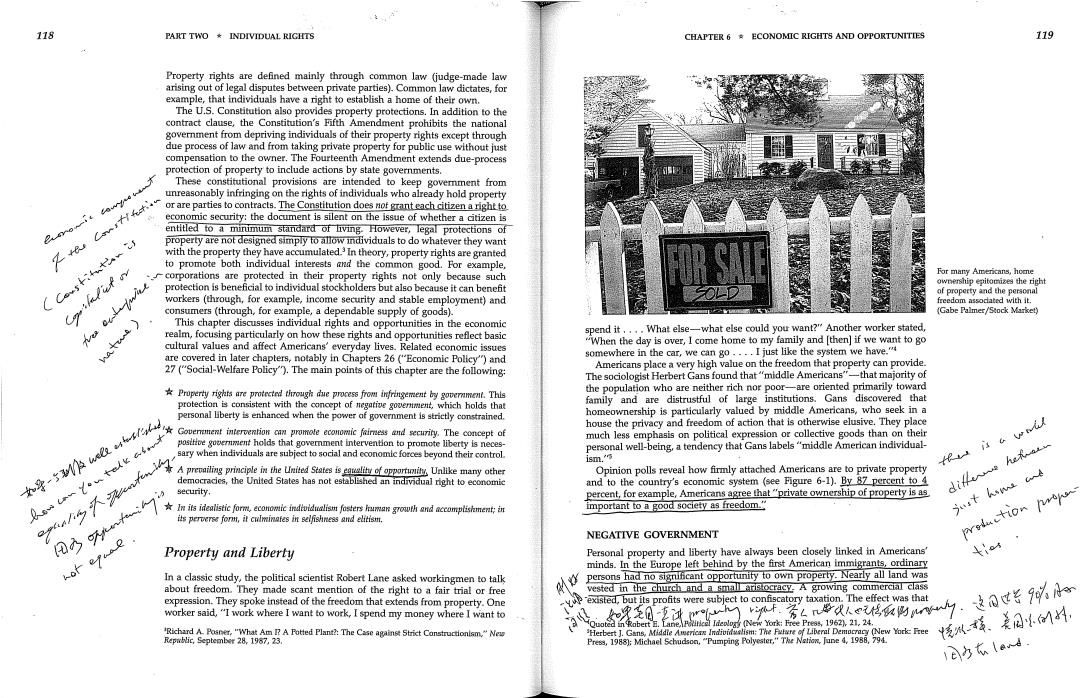正在加载图片...

118 PART TWO INDIVIDUAL RIGHTS CHAPTER 6 ECONOMIC RIGHTS AND OPPORTUNITIES 119 Property rights are defined mainly through common law (judge-made law arising out of legal disputes between private parties).Common law dictates,for example,that individuals have a right to establish a home of their own. The U.S.Constitution also provides property protections.In addition to the contract clause,the Constitution's Fifth Amendment prohibits the national government from depriving individuals of their property rights except through due process of law and from taking private property for public use without just compensation to the owner.The Fourteenth Amendment extends due-process protection of property to include actions by state governments. These constitutional provisions are intended to keep government from unreasonably infringing on the rights of individuals who already hold property or are parties to contracts.The Constitution does nof grant each citizen a right to economic security:the document is silent on the issue of whether a citizen is entitled to a minimum standard of living.However,legal protections of property are not designed simply to allow individuals to do whatever they want with the property they have accumulatedIn theory,property rights are granted to promote both individual interests and the common good.For example, corporations are protected in their property rights not only because such Fot many Americans,homne protection is beneficial to individual stockholders but also because it can benefit of property and the workers (through,for example,income security and stable employment)and freedom assodated with it. consumers (through,for example,a dependable supply of goods). (Gabe Palmer/Stock Market) This chapter discusses individual rights and opportunities in the economic realm,focusing particularly on how these rights and opportunities reflect basic spend it....What else-what else could you want?"Another worker stated, "When the day is over,I come home to my family and [then]if we want to go cultural values and affect Americans'everyday lives.Related economic issues are covered in later chapters,notably in Chapters 26("Economic Policy")and somewhere in the car,we can go....I just like the system we have." 27("Social-Welfare Policy )The main points of this chapter are the following: Americans place a very high value on the freedom that property can provide. The sociologist Herbert Gans found that"middle Americans"-that majority of the population who are neither rich nor poor-are oriented primarily toward protection is consistent with the concept of negative govemment,which holds that family and are distrustful of large institutions.Gans discovered that personal liberty is enhanced when the power of government is strictly constrained. homeownership is particularly valued by middle Americans,who seek in a house the privacy and freedom of action that is otherwise elusive.They place 乎-sAue&yefd以 much less emphasis on political expression or collective goods than on their 置营量 rment holds that ent intervention to promote liberty is neces personal well-being,a tendency that Gans labels"middle American individual- m.% 宁之naeu色 A prevailing principle in the United States is equslit of opportuiny Unlike mamy other Opinion polls reveal how firmly attached Americans are to private property democracies,the United States has not established an individual right to economic and to the country's economic system (see Figure 6-1).By 87 percent to 4 di从ehe天a 恨是 security. percent,for example,Americans agree that "private ownership of property is as R办呀门 important to a good society as freedom." 4t人sa 车ec%onM,it culminafes in s2fss5Qd出tisn, proiuction pops NEGATIVE GOVERNMENT Property and Liberty Personal property and liberty have always been closely linked in Americans 4 minds.In the Europe left behind by the first American immigrants,ordinary In a classic study,the political scientist Robert Lane asked workingmen to talk persons had no significant opportunity to own property.Nearly all land was about freedom.They made scant mention of the right to a fair trial or free vested in the church and a small aristocracy.A growing commercial class expression.They spoke instead of the freedom that extends from property.One 欧风5dhF.法,以人元恺财4.2园便若9, profits were subject to confiscatory taxation.The effect was that worker said,"I work where I want to work,I spend my money where I want to Quoted in Robert E.Lane,Polesl Richard A Poser,"What Am A Potted Plant?The Caseagans Strict ConstruiNe SHerbert J.Gans,Middle Auericax Individuslism:The Fulare f Lberal De 悦州落.美园小M, Repicblic,September 28,1987,23. e乃衣{and